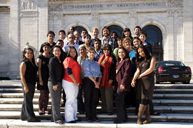- English
- Español
IACHR
Courses
Every year since 2005, the IACHR organizes two courses at headquarters on the Inter-American and International Systems for the Protection of Human Rights, which take place while the Commission holds its Periods of Sessions of July and of October-November.
The July courses are directed to offer to Government agents practical experience in the protection system. The course offers the participants comprehensive and practical training on the functions and operations of the Inter-American Commission and Court of Human Rights. It also covers strategies and best practices for the implementation of human rights standards at the national level.
The October-November, on its part, aim at offering tools to non-governmental organizations (NGOs) to help them define strategies in the use of the Inter-American and the UN protection systems. The course offers participants the opportunity to assist to sessions and hearings of the Inter-American Commission.
All courses are taught in Spanish, so a good command of this language is a requisite to take the course. The courses are announced on the webpage in Spanish. Below is an example in Englihs of such announcements, corresponding to the October 2010 course. Please see all announcements in Spanish here.
Course on the Inter-American and International Systems for the Protection of Human Rights
The Inter-American Commission on Human Rights (IACHR), the American University Washington College of Law, and the Bernard and Audre Rapoport Center for Human Rights and Justice at the University of Texas organized the Fifth Course on the Inter-American and International Systems for the Protection of Human Rights. The course took place October 18-29, 2010, parallel to the 140th period of sessions of the IACHR, in Washington, D.C.

Students in the Course on the Inter-American and International Systems
for the Protection of Human Rights, offered in October 2010.
This course, which has been organized once a year since 2005, aims to provide nongovernmental human rights organizations (NGOs) with tools to help them define strategies for using both the inter-American and United Nations protection systems. The course gives participants the opportunity to attend the Inter-American Commission’s sessions and hearings. Several of the course modules are offered by specialists from the IACHR Executive Secretariat. Course participants also have the opportunity to establish contacts with members of NGOs who attend the IACHR sessions in Washington and who have a long track record and vast experience in using the tools available through the inter-American human rights system.
The course is geared toward members of NGOs who have used or continue to use the inter-American and international human rights systems, and who need additional technical training in how the various protection mechanisms work. The course has a largely practical focus that allows the participants to acquire skills to make use of the system.
The process of selecting participants aims to achieve a balance in terms of gender, the thematic work areas of the organization they represent, and their geographical area of activity. Course participants must have at least three years’ active work experience in a human rights NGO; have basic knowledge of or experience in the use of regional or universal mechanisms for the protection of human rights; work for an NGO that has the capacity to make use of the inter-American system; and have a good command of the Spanish language.
The course includes presentations on the inter-American and universal human rights systems and on case law and notable cases, and offers training in how to file petitions and how to work with victims of human rights violations, as well as training in litigation strategies. Class modules include the following:
- Introduction to International Human Rights Law
- The Inter-American Protection System
- The International Protection System
- Comparative Analysis of Regional and International Systems
- Presentation of Cases before the United Nations System: The Treaty Bodies
- The Inter-American Commission on Human Rights: Latest Developments, Agenda, and Work Method
- The Inter-American Court of Human Rights
- The Inter-American System’s Case System and Rules of Procedure and Evidence
- Hearings
- Case Law. Most Significant IACHR Decisions
- Work with Victims of Human Rights Violations
- Follow-up to and Implementation of IACHR Decisions
- Use of the System’s Case Law to Establish Domestic Human Rights Standards
Participants are responsible for finding their own funding to attend the course. The course coordinator may assist the selected participants in the process of seeking funds. On occasion, the IACHR is able to obtain financial resources to offer a limited number of scholarships; these are distributed taking into account, among other factors, the efforts each candidate has made to obtain his or her own funding.

